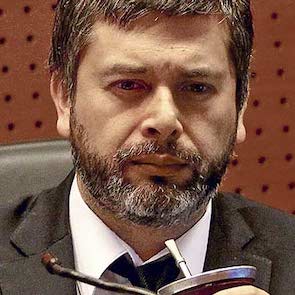Harassment and smear campaign against human rights defender Daniel Urrutia Laubreaux
On 3 January 2020, a disciplinary case was opened against judge Daniel Urrutia Laubreaux at the Court of Appeals of Santiago, after he had summoned the mayor of the Santiago Metropolitan region, Felipe Guevara, to court, in relation to the arbitrary detention of a peaceful protester. Shortly after, on 8 January, the Court of Appeals of Santiago accepted another disciplinary complaint against the judge, in relation to media interviews he had given. These disciplinary proceedings are part of a series of attacks which appear to be aimed at preventing the judge from acting independently.
 Daniel Urrutia Laubreaux is a supervisory judge* and human rights defender who has ruled in cases against the Chilean State, State police, and public administration personnel. Throughout his career as a judge, he has actively defended human rights, including the voting rights of persons in pretrial detention, the rights of minors in provisional detention and the right to freedom of assembly and association, among others.
Daniel Urrutia Laubreaux is a supervisory judge* and human rights defender who has ruled in cases against the Chilean State, State police, and public administration personnel. Throughout his career as a judge, he has actively defended human rights, including the voting rights of persons in pretrial detention, the rights of minors in provisional detention and the right to freedom of assembly and association, among others.
*Supervisory judges are mandated to safeguard the rights of individuals during criminal proceedings.
On 3 January 2020, a disciplinary case was opened against judge Daniel Urrutia Laubreaux at the Court of Appeals of Santiago, after he had summoned the mayor of the Santiago Metropolitan region, Felipe Guevara, to court, in relation to the arbitrary detention of a peaceful protester. Shortly after, on 8 January, the Court of Appeals of Santiago accepted another disciplinary complaint against the judge, in relation to media interviews he had given. These disciplinary proceedings are part of a series of attacks which appear to be aimed at preventing the judge from acting independently.
Daniel Urrutia Laubreaux is a supervisory judge* and human rights defender who has ruled in cases against the Chilean State, State police, and public administration personnel. Throughout his career as a judge, he has actively defended human rights, including the voting rights of persons in pretrial detention, the rights of minors in provisional detention and the right to freedom of assembly and association, among others.
Since October 2019, when the social and political crisis began in Chile, Daniel Urrutia Laubreaux has been constantly harassed for ruling in cases related to the exercise of civil and political rights. He has publicly spoken out on human rights violations and "state terrorism" committed in the context of the social outbursts in the country. This has led to various incidents, including suspected phone surveillance, defamation, judicial harassment and smear campaign in retaliation for his work as a judge and human rights defender. Since January 2020, he has been targeted with attacks on social networks with individuals calling for his dismissal using the hashtag #RemociónJuezUrrutia, as well as pronouncements by former government authorities such as former Congressman Gustavo Hasbún, who stated that Urrutia "is an embarrassment to the Judicial Branch”.
This is not the first time that the judge has been harassed for his work in defense of public freedoms in Chile. In June 2006, he visited the Santiago Sur Pretrial Detention Center, where he found that more than 100 inmates were sleeping outdoors. He sent a harsh report on the issue to the Supreme Court Prosecutor's Office and the Court of Appeals in Santiago. Soon after, unknown individuals shot at his office. In 2009, he had to take unpaid leave and move to Mexico for three years due to the harassment he had been subjected to by senior judicial authorities, which could have affected his independence as a judge.
In February 2019, the Inter-American Commission on Human Rights presented Case 12.955, Daniel Urrutia Laubreaux v. Chile to the Inter-American Court of Human Rights. The public hearing will be held on 30 January 2020 in San José, Costa Rica. The case is related to an academic project carried out by the human rights defender in which he criticised the Supreme Court of Justice for its involvement in human rights violations during the dictatorship, and demanded a public apology for the crimes committed. For this reason, his work was censored, a sanction which was later reduced to a warning.
In addition to the disciplinary cases opened against him in January 2020, judge Daniel Urrutia Laubreaux is facing three administrative cases initiated against him four years ago. Front Line Defenders is concerned about the harassment, including judicial harassment, and threats against Daniel Urrutia Laubreaux, which demonstrate a clear pattern of criminalisation and reprisals for his work defending human rights and democracy in Chile, especially in the context of the current political and social crisis.
*Supervisory judges are mandated to safeguard the rights of individuals during criminal proceedings.
